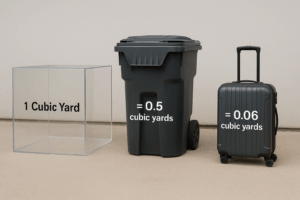What Does a Cubic Yard Really Look Like?
When planning a cleanup, remodel, or yard project, one of the biggest questions is: how much space do I really need for all this debris? Dumpster sizes are measured in cubic yards, but that number can be hard to visualize. To make it simple, here’s what a cubic yard looks like compared to common household items you already know.
Everyday Comparisons


-
96-Gallon Trash Can → holds about 0.5 cubic yards
-
Carry-On Suitcase → holds about 0.06 cubic yards
-
Pickup Truck Short Bed (F-150, Silverado, RAM 1500) → holds 1.5–1.6 cubic yards
Now think about it: a 12-yard dumpster from Neighborly Hauling is equal to roughly 7–8 pickup truck loads or 24 full 96-gallon trash cans. That’s a lot of trips to the curb or the dump that you can eliminate with just one delivery.
That’s why our 12-yard dumpster makes sense—it holds the same as 24 trash cans, all in one clean, driveway-friendly container.
Why Dumpsters Beat Pickup Trucks
Borrowing a friend’s truck might seem convenient, but here’s what it really means:
-
Multiple Trips: Even a big truck bed (8 feet long), if heaped up above the rails, you might squeeze in closer to 3–3.5 cubic yards, but that’s not safe or recommended for hauling heavy debris. To move 12 cubic yards, you’d be making 4+ trips.
-
Time Lost: Loading, driving, unloading, and repeating eats up your whole day.
-
Hidden Costs: Fuel, landfill fees, and the wear-and-tear on a truck add up fast. One truckload costs $35 per load. A flat tire can cost hundreds to repair.
-
Limited Capacity: Heavy debris like shingles, concrete, or soil maxes out a pickup bed before you reach full volume.
One dumpster drop from Neighborly Hauling solves all that. We deliver it, you fill it, and we haul it away—no borrowed trucks, no endless trips, no back-and-forth headaches.
Plus, with a pro hauler, you know the debris is handled legally and safely—why hiring a licensed and insured dumpster hauler matters.
The 96-Gallon Can Reality Check
Let’s say you try to clean up with just your household trash cart:
-
One cart = 0.5 cubic yards.
-
A small dumpster (12 yards) = 24 full trash carts.
-
Imagine hauling 24 carts’ worth of debris to the curb or transfer station!
Not only is that impractical, but many items (construction debris, furniture, heavy materials) can’t even go in your city-issued bin. That’s where a dumpster becomes the clear choice.
Remember, not everything can go in your bin—see our guide on what not to put in your dumpster to stay compliant and safe.
The Neighborly Difference
-
Sizes that fit your project: 12, 17, 21, and 25 yards—always driveway-friendly.
-
Efficient hauling: One bin replaces dozens of trips with a trash can or pickup.
-
Driveway protection: Every dumpster sits on Rolliskate pads to prevent damage.
-
Local expertise: We haul to Kent County and Pitsch transfer stations, supporting landfill reduction.
Wrap-Up
A cubic yard is smaller than you think—but debris adds up faster than you expect. Don’t waste time with trash cans or multiple truckloads. With Neighborly Hauling, you get the right dumpster for the right job, delivered where you need it.
? Book Now and save yourself the trips, time, and hassle.
